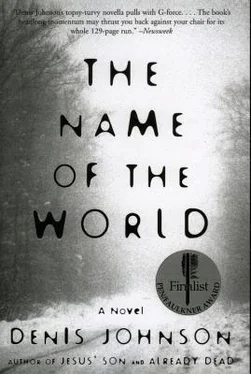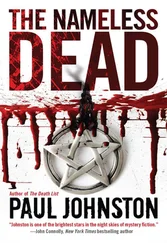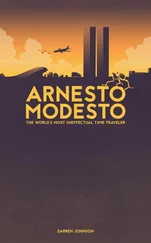The final event on my calendar would be the expiration of my lease at the end of June. I should get out of town before then. I had no summer classes, no business here, no people keeping me — my time was up. But when classes ended in the spring, I didn’t go.
By the middle of June the town seemed stunned by the summer, emptied of nearly half its people, after all, and the livelier half at that. It was hot. Humid. I was idle. Bored. Almost every weekday afternoon I met Ted MacKey at an air-conditioned basement tavern and watched him get drunk. Then we went to our separate dinners.
Sometimes Eloise Sprungl joined us. She was the woman who catered many of the dinners for the Liberal Arts faculty. I’ve described her as the image of Peter Lorre. For some years she’d been tenured faculty in the Art Department and had even done a turn as department chair, but one day she’d simply stopped showing up for work. Tendered her resignation. She painted almost daily now, had a studio in her home, but she didn’t think she was any good. All this and more she told me in the time it took her to smoke a cigarette and down a double schnapps while we waited for Ted to come wobbling down the stairs of Dooley Noodle’s, the basement tavern — the first moment she and I were ever alone together. She revealed that two years before, her husband had died of lymphoma, a complication of AIDS.
At one time or another she claimed to have bombed a power plant in the seventies, to have invented a process used in long-range observatory telescopes, and to have conducted, as a girl of thirteen, a red-hot love affair with Ernest Hemingway that spanned the globe, and she hinted she was the reason he’d ended it all. She liked referring to herself as the Froggy Bitch. “Give the Froggy Bitch a light…” “The Froggy Bitch must excuse herself to pee…” “Even the Froggy Bitch gets hungry, so let’s eat!” Yet with all that had happened to her, she seemed neither sad nor angry. I’m not sure why I bother talking about Eloise except to reflect, for my own benefit, on the kind of people I was drawn to. State-run education was mostly show. She and Ted Mackey were open about that. They were just the type to thrive in these vapors of low-lying cynicism, occasional genius, and small polite terror.
And Ted has, in fact, continued to flourish. So has Eloise Sprungl. And although I see I’m not yet quite finished recording these memories, I might as well tell about some of the others:
Clara Frenow beat the cancer permanently, took early retirement, and either joined the Peace Corps or bought a bed-and-breakfast in Minnesota, so the reports went. Maybe she did both. As for Flower Cannon, I have no idea what’s become of her, but if I ever track her down I’m sure she’ll be up to something quite shocking and also absolutely no surprise. Of course all along I’ve been disingenuous when referring to Tiberius Soames, as I’m sure the name was familiar. Three years ago he and Marcel Delahey shared the Nobel Prize for economics. He’s got a big endowed chair now at the University of Chicago and all day long does whatever he wants. Ted MacKey and I still correspond, or anyway exchange postcards. His last: “I’m pimping a couple co-eds now, and I’ve joined a coven. Marie [his wife] has had a sex change. We never liked you. Keep in touch.” The photo shows a vast field of profoundly green cultivated rows across which he’s scrawled excuse the corny sentiment.
And, of prizes: You may be aware of T. K. Nickerson’s Pulitzer — his second Pulitzer — the year before last. I bought the book, found it unreadable. He followed quickly with another, which I picked up browsing in a store one day and which by that evening I’d devoured in one sitting, and I’ve since read it again with just as much pleasure. So he still knows how to write. He married Kelly Stein, or so I think I heard. And what about J.J.? Two years back this short letter came to me, and I haven’t yet tossed it out:
Dear Michael,
This is going to be a strange little note, Mike, but I can’t shake this annoying ridiculous sense I have that I said something I didn’t finish, but have to get said completely. It’s selfish of me to bother you with this, because you’re no more involved than in the capacity of the chance bystander, poor guy. But I’m not explaining, so I’ll explain. After the night I had dinner with you at Capiche, the night I learned of Trevor Watt’s passing, I told you he’d been important at first and then I realized I hadn’t thought of him in years. The uncompleted thought is this: No, that was wrong, and I should have gone on to say: Now he’s dead and I realize I feel free, because whether he’s occupied my thoughts or not, Trevor has always been there. Always riding me, riding my life. As melodramatic as that sounds. And now he’s dead and the weight is lifted. What a happy death! That’s what I want to say, and do you see I couldn’t say it to anyone who actually knew him. I suppose you do see that. So you get the news: What a happy, wonderful death!”
J.J. goes on to say he’s seen a piece of mine in Men’s Journal . “What a coup!” he says. I don’t hold the sarcasm against him.
Otherwise I’ve had nothing from any of that bunch, except, as I’ve said, the occasional card from Ted MacKey, whom I invite you to imagine facing me in a booth those several years ago in a basement tavern, our hands around cold drinks, while outside the Midwest pounded in a heat wave. Eloise was with us too. She didn’t talk much today. Ted leaned toward me, drunk, huddled around some inner upright and saying only, “You don’t know. You don’t. You just don’t know.” He’d fed some dollars to the jukebox and set it to play “Let Me Roll It” by Paul McCartney infinitely. After a few drinks Ted conversed very little. He mostly sang.
I went down to St. James Infirmary
And I saw my baby there.
She was stretched out on a long white table,
So still, so cold, so bare,
he was singing now (while the jukebox played Paul McCartney).
Let her go, let her go, God bless her,
he sang, throwing wide his arms.
Wherever she may be….
By wrecking the rhythm, he braided the old spiritual together with the McCartney tune coming out of the jukebox, and made an odd duet.
“Reed,” he said, “Reed. Just, man — bury me where the corn don’t grow.”
Eloise laughed and hacked. She had the smashed sinuses of an English bulldog.
Here I’ve let my memory veer down the stairs and float alongside the bar and hover in the light of the jukebox, when actually there’s no point. Nothing worth telling about happened down there. Or up in the world, for that matter. I’d packed my few belongings in boxes and was ready to move to a motel until I found a reason to depart — until I had a destination. Other than that, the whole month of June had barely managed to occur. But it went out with a lot of noise.
On the twenty-ninth I drove Ted home from Dooley’s because he seemed to think that was best. He hadn’t thought so any of the other days he’d lurched to his feet after several drinks, announced he was hungry, and marched with a mechanical determination up the stairs. But today I drove him, and Eloise Sprungl, too. Ted insisted we go to his house first, however, because he wanted to show me something.
“Okay, what is it?” I asked when we’d pulled up in front of his big home.
“The car. I’m showing you the car.”
“Well, it’s an excellent car, Ted.”
I hadn’t driven a car in a long time, not in four years, plus three months. I liked driving the car.
“It’s a 1985 BMW three-oh-two or two-oh-three, or — do you want it?”
“Want it. To own?”
Читать дальше











